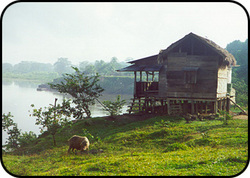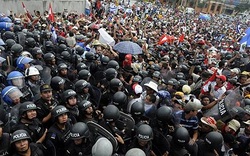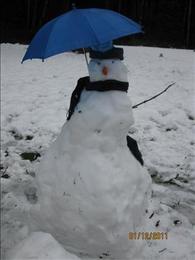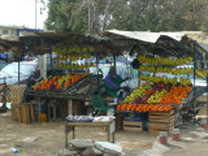Central America
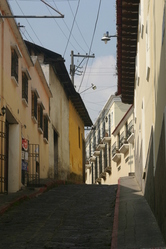 Streets of Xela, Guatemala
(Cont. from p. 1)
Trust. To live requires daily trust. Trust that tall buildings will not topple in an earthquake. Trust that most people will play by the rules and that we are safe around our neighbors, even if they have guns in their homes. That trust was shattered for many of us in the US one morning not too long ago when two planes were driven, by design, into two office towers full of thousands of people going about their daily business. People who trusted that their place of work, like their homes, were safe from madness. Trust was similarly shattered 25 years ago in Guatemala when the government unexpectedly sent troops to small villages in the countryside, to massacre thousands of unarmed men, women and children with the sole purpose of terrorizing those that remained alive into fear and submission. Over 150,000 people were killed here during a decades-long civil war, only recently has that trust with government forces begun to heal. Yet that growing trust in government is again being tested in the upcoming election next month here. The general who led the massacres, Rios Montt, is running for the presidency and by December, some predict, could be the new president here. I am here in Central America to learn. For the past 12 years I have worked with public schools in Seattle, helping schools design strategies to create great learning environments for every child, especially in schools most challenged by poverty. I began work with schools in part because I believe they are the single most important community institution for improving society. Its where kids who haven¹t got a break in life can get a chance to dig out and succeed. It¹s where we, as a society, have a real shot at helping us all to figure out how to make a better world, and equip us with the intellectual and emotional tools to do so. We in America may understand what makes our own country tick, but we are in a barren desert when it comes to uncovering the perspectives held by other cultures around the world. If we didn't know that before, we got a real wake up call on the morning of September 11. "I want a school here because I want my child to have a better life than me" -Juan, President of parents committee in small village outside Quetzeltango Nearly 80% of families are in poverty here in Guatemala, and most kids drop out of school by the sixth grade to work. Girls in rural areas are lucky to get beyond 3rd grade. The countryside village I visited this week had no school at all 5 years ago until a local organization called Fundap helped them to organize and finally get a school going. While there are huge differences in cultures, as we all know, some things remain the same. We want a better life for our children. Getting a school in Guatemala up and going, to make that dream for a better life a reality, may not be what you think. This school, typical in many rural villages, is a one room classroom, about 12 feet by 14 feet. The 20-30 kids going to school here do have some desks, resting on a dirt floor, in a building constructed entirely of sheets of tin for the roof and all sides. No windows. If you wanted to build an effective sauna, you could find no better equipment than this. There is both good and bad news here. The good news is that the community has now, with the help of this local organization, secured enough money to get the cement blocks to build a new classroom, using the sweat equity of the parents to put it together. It has a cement floor, a large window for ventilation, and running water and electricity. It opens next week. The bad news: in December of last year, schools like this one, and 97 others like it around this part of Guatemala no longer can be helped by Fundap because the government demanded that the teachers Fundap trains for the schools must make giving out propaganda in support of the current party in office part of the curriculum, and Fundap refused. After seeing another school almost identical to this one, but larger, in a nearby community, we visit another project where young girls are being trained in cooking pastries, sewing and hair cutting. The girls are all teenagers, learning a trade, and an older women walks in to greet us. Turns out she is the mother of two of the 50 girls receiving this 6 month training. I learn that she heard through her church about the good work of this organization, and donated her house to make it possible for girls in her community to get training. She is a woman of very modest means, and lives in a smaller, attached structure around back. I am blown away at the generosity of this woman. While not dirt poor by Guatemalan standards, she lives very frugally, judging by her home we sit in and have tea. I walk home after this day of travels in the countryside, my back again to the cars As they whiz by and let the day's film in my mind be replayed. I watch the 9 year old boy greet me in the sauna-school and re-hear him sing solo to me his country's national song. What can we learn from these families about how to find happiness? among grinding poverty? I hear the voice of Juan, the current president of the parents group tell me how his small community is able to grow all the food they need for their own community, and marvel at their ability to be self-sufficient. I think about the generosity of this woman who gave her home up to improve the lives of girls in her community. And I wonder: of what value is there to be found in a partnership with a school in America by the teacher in this one room, dirt-floor school house? A teacher who has too few textbooks, but a caring community that wants the best for its children. A community full of families that will build a school, but may have to take their own children out of it next year to work the fields or demand that their nine year old son find a job in construction so the family can meet its basic needs. This teacher has to decide how to integrate political propaganda into the curriculum, so where is there room for pen pals, interchanges among teachers across international borders, and sharing curriculum with students in a classroom in America? What does make sense for this teacher, and would form the basis of a deep, lasting partnership of mutual benefit? I hope to find out. I trust that my brain will somehow make room for another language despite being filled with other important data, like the lifetime batting average of Roger Hornsby. I trust that my eyes, organs that require a visual aid already to work, will somehow make another huge adjustment and see that the world has more than one reality. And I trust that I can keep track of my passport for another 2 months so the authorities wont toss me in jail for the next decade. If they do, at least you all will know where to find me. 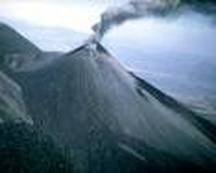 Picaya Volcano, where we hiked
Its 5am, the sun is just getting up and so am I. Our van leaves for Volcan Picaya in one hour, one of three still active volcanoes among 33 others in Guatemala, and I need to still execute the still-dark cobblestone streets, marked by only occasional signage, to find the store that the van is to leave from. Its a small group of vagabonds I finally find, looking dazed, numbering just 7. You could add up all their ages and still barely reach mine, I think. We hop aboard this mini-van, circa 1980.
The sun is now casting its soft, hazy light through the morning dust, and I think I can see clearly now the road ahead. My tea bounces wildly in my Styrofoam cup, and by the time we are three blocks through this town of streets made from chunks of volcanic rock, my cup is but a shell of its former self, mangled and nearly empty. It looks like I had a serious accident down my left leg. Not a good way to kick off the day. The van is too noisy to converse so I talk to myself again. The elections are drawing nearer, and at times I think I am getting a good feel for what is happening. A critical election, but the international community has rallied and hundreds of folks have been getting training in election observation and poll monitoring. Lots of Spanish school students tell me they are planning to be official observers to help out as well. There are posters of candidates everywhere, and lots of trucks with loud speakers cruising the streets in each city I visit. It is beginning to feel like a lively, yet democratic and peaceful election. And yet. I talk with one free lance reporter from England who has been here a few months. She tells me that the problem is not the day of the election. There probably wont be a lot of voter fraud on election day. Because all the monkey business is happening before the election. Yesterday, in a confirmation of the above, I am told by the director of a local education non-profit that the paper just reported that 33 communities have recently had all of their town records burned. The towns no longer know who is a voter, who is age elgible, thus creating a real nightmare to know which votes to count. 2 political leaders have also been shot and killed. No one claims responsible for any of this, but the current party in power, the infamous FRG, is the top suspect. Our van putters along across several small hills toward our destination. At the base of the volcano, we begin to climb steeply to a small town called San Francisco, our drop off point. 3 miles from the town, our van sputters to a halt, supposedly due to cheap, bad gas. Our driver excuses himself, and begins walking through the jungle toward some town, as he walks away he waves and says "Regresso in diez minutos", but some of compatriots are not convinced. We wait on this lonely road, the two oldest among us calming the others, saying all is cool. Yea, like we really know. A small herd of cows pass by, an old man bicycling this awesome hill, a few more mountain people-types and then 25 minutes later, a truck comes down the hill, filled with 3 members of the national police. They examine the situation, and then instruct us to hop in the pickup and they will take us the rest of the way. Great. We are saved by the national police, part of the infrastructure of the present right wing government. I choose not to practice my espanol with them, about things like the upcoming elections and all. I think I am becoming what some of you call "a seasoned travel, como no?" In the 80´s many young men were forced to serve in a police force, of sorts, patrolling their own villages supposedly for their own village's safety from the guerrila opposition. This after the government had massacred tens of thousands. This supposedly "volunteer" conscription was resented by many, yet nearly impossible to avoid. Some ended up identifying with those in power and went on to terrorize others as well. Today, some tell us, these folks number nearly half an million (called ex-PAC civil patrols) and they are mad as hell because they have never been paid for their service, and the current government, in an attempt to win more votes, promised them payment. This past week, I read a group of ex-pacs have kidnapped 1 politician and 6 journalists, and are holding them until they get paid. This too, I decline to bring up with our newly-acquired police amigos. We finally get to our jump off point, and unravel our legs. We start up the very steep mountain, through dense underbrush. Our guide points out the beautiful fauna, and tells us that Marimbas are made from the tree we now look at, a Armigo tree, I believe. Several young local children, the oldest no more than eight years old, are in another group right in front of us, and headed up the mountain as well. Scbools are out for two months right now, but I still have been able to meet with several more folks, including parents, teachers, and NGO non profit leaders to discuss schools and see the physical structures. This is such a young country of 11 million people or so (no one has decent data in this country, so much of everything, including illiteracy and poverty rates are estimates), and most of those are under the age of 18. In one small town, the parent leader tells me of the 500 people in her village of San Marcos, fully 60% are under the age of 12. Most kids go to first and second grade, but of 500 kids, only 26 made it to 6th grade this year at this small village grade school. Teachers hired by the government generally get paid about $250 a month, an OK wage for here. But I am told, up to half the teachers are on contract, year to year, and get paid just over half that amount. What is worse, it is quite common that the contract teacher needs to personally pay the mayor or a supervisor who decides on their annual renewal at the school of their choice. Those who dont get dumped and are sent to towns far away, making for some pretty long walks to school, or else no employment. I think the Seaattle Teachers Union might oppose this procedure?! Schools in the rural areas are diverse, but in a different way than what you might imagine. Because the country is 60% Maya, they speak a wide variety of Indian languages, none of which are Spanish, the national language. So they are taught in Spanish from day one, adding one more tough step in their climb to an education. The Peace Accords signed in 1996 call for teachers to be bilingual, but most have just high school educations and its lucky to have a teacher who speaks the local dialect as well as Spanish. Most some NGO's are working hard on to expand these kind of teachers. I think about all this, as Julio and his sister, the two grade school kids who have befriended me, now challenge me to race up the mountain against them. Never one to shy away from a competitive gig, I take a big bite of my powerbar, a swig of my gatorade, tighten up my well fitted "New Balance" hiking shoes, and the race is on. When we reach the top, a spirited race won handily by these two veterans, I see they have no water, or food, just big smiles. We share the spoils in my fanny pack, talk in broken Spanish (mine, not theirs), and I think more about the race we have just waged and its accurate analogy to education here and there. We take a few steps to the edge of the volcano, and look down through the rapidly rising plume of yellow smoke, down into the entrance to hell, or at least as I imagine it. (I hope this is not a predecessor of things to come!) The steam is very warm, but it is a sunny, slightly windy day at the top of this mountain giant, and we can see the pineapple fields miles below, and across to Volcan Fuego, also sending up a big fume of smoke. Infamous Guatemala city, the capital and center of the currrent corrupt government is also below, looking like the Emerald City from the Wizard of Oz. More layers of reality that create such a contrasting, incomplete picture here. Upon the recommendation of our guide, we end the day by literally skiing in reckless abandon down the mountain side volcanic rubble, in under 5 minutes. A distance that took 1 hour to climb. Its straight down the volcanic scree, and we take it like Olympic downhill racers, hopping from side to side. (Juilio and his sister wisely choose not to challenge me on the descent. They sensed the fire in my belly, I suspect, after the crushing defeat they had meted out to me only minutes before. Only my most competive tennis partners know this dastardly quality all too well. . . ) We reached the new replacement van an hour later and headed home. As the newer model van wrestled with the hills, I reflected on what strategies we refined at Powerful Schools might apply to the school communities I had seen so far. I am surprised at the number of things that seem like they might make sense here. Tying local communities to schools seems possible, and I see examples of some of this in the schools I have been told about. There is not a lot of parent and community involvement, but the schools are open to it, and some community folks do get involved, sharing talents. Although there is little infrastructure here of local foundations, there is some efforts being made successfully to raise money from individuals, local businesses, and certainly international aid groups. Lots of parallels to Powerful Schools funding base. Schools however use almost exclusively a rote memory approach to learning, very little creative thinking skills being exercised, several leaders tell me. There are a couple groups doing some beginning teacher training in some of the schools I have looked at, but it is incredibly thin, and little is done directly in a teacher's own classroom. On the way home the van breaks down 4 times, too weak to pull us up the hills, so we walk along the side of the highway, when the road gets too tough for our van. We arrive home by 2:30pm and I am exhausted, hungry, dirty, and sleepy. I fill up on two more meals before nightfall, take a nap and later head out into the cool night air, just perfect for a light long sleeved shirt. I relax in Park Central, surrounded by buildings designed 3 centuries ago, and still standing, thanks to the low-ceiling, flexible construction, called "earthquake architecture"used here. There is a fountain in the middle of the park, water spewing forth from the ample breasts of lovely women statues. It reminds me of Italian and Greek art I saw years ago with a similar senses of humor. The square is mainly filled with beautiful Maya women selling their weavings and other native artifacts, while their young children help sell with them, the smaller niños nestled in the breasts of the real woman in the plaza, drawing forth the mom's life-sustaining milk. Its 11pm and the family's here are still selling. I am exhausted and I head home to sleep. 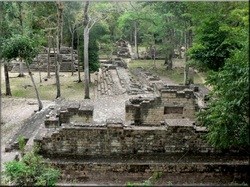 Mayan ruins near Copan
"On the same spot I sit today others came, in ages past, to sit. One thousand years, still others will come. Who is the singer, and who is the listener? -Nguyen Long Jru
It is a steamy, overcast morning in Copan, Honduras. I sit atop one of the most magnificent Maya temples, listening to the wonderous musical talk of free McCaw birds nearby. The rains begin and my guide points out to me the stone irrigation system below, now drawing water away from the temples as it has for over 1500 years. In a land torn by earthquakes, volcanoes, ravaged by war and surrounded by a hungry jungle that eats everything in its path, these irrigation ditches give new meaning to "it takes a beatin´, but keeps on tickin.´ " Yesterday, my new backpack, bought in the Mercado two weeks ago, went belly-up, the zipper splitting apart like a piece of rotton fruit. I have bought 4 new pens here and they all leak. A soft-brush toothbrush is not to be found here, only hard-brushes the eat your gums, all of the above the victims of goods sent here that are the hand-me-downs and rejects of other countries. Everyday I see someone toss their empty bottles and wrappers out windows of the local busses. But before I become too incensed at the useless pollution of this magnificent countryside by natives here, I remind myself that our country is dumping its waste here too. The backpack, 4 pens, and hardbrush toothbrush I bought this past month are just the tip of a huge stream of damaged goods shipped here and added to the unburied wastestream. Which is of the greatest scale, causing greatest harm, I wonder? If humans could build a virtually indistructable irrigation system 1500 years ago, surely we can do better than this. The Mayas today, who make up the majority of people in Guatemala, have a spiritual belief system that also sheds new light on old things for me. Like some eastern philosophies, and other Native American beliefs, they believe everything-the Gods, those passing on to the Underworld, and material things and events- each carry both good and evil in them. This is quite unlike the other major religion here, Catholicism, whereby all things are divided into good or evil. When you look at the world in this new way, at least for me it is new, it provides a fresh perspective on nearly everything. Even defecting backpacks. This morning I catch the headlines in the local La Prensa and learned that 49 people were killed in Instanbul. I feel a jolt from this unexpected unleashing of hate, as I stand on the street corner of this humble town, something like the first shakes of an earthquake under your feet. Uncontrollable, unexplainable. And I wonder, "how will we respond, what will we learn from this, where is the good that lies within this?". Somedays, its hard to find. But we do live in a new world. The Maya culture was brought to its knees by wars that ultimately left only ruins covered by jungle, and questions about why, with such a highly developed culture, it had to be so. Will we carve a new path with this new knowledge? Will we use the incredible potential of US might, wealth and wisdom to do what no other civilization has done before us? Is that the potential good that could reside in this mountain of evil? I wonder how we construct an education system that can serve this end. More school for kids seems an obvious answer, especially when students here from rural areas typically go up to 3rd grade, then quickly drop out. And Guatemalan schools, while it lasts 180 days, is only 3 hours a day. I met an Austrian women this week who tells me in her country education is fully paid for through college, for everyone! Why can´t we do that in the US? Or, as some argue, at least get every kid off to a good start by providing fully funded pre-kindergarten. But is more education really the answer? Do we become a smarter, more caring nation with more education? Does a wealthier nation become a more generous nation? "The Devil himself must have a perverted fascination with this country, I think sometimes that he can corrupt anybody. Not even a fine education guarentees protection . . . " -"The Long Night of the White Chickens", (from a novel, set in Guatemala, I now read) In Guatemala everyone complains of corruption in government, and in Honduras I find the same thing. Yet, on the chicken busses, those brightly painted busses that serve as the backbone of the transportation system throughout Central America, a little different picture emerges. I meet a woman way out in the countryside who is training poor women to start and run their own businesses, and providing micro-loans to them to get started. The program now operates in nearly every part of the country, and was initiated by the wife of the current supposedly corrupt President in Guatemala. In Honduras, while I am shaking off the last vestiges of food that did not quite make it "successfully across the cross-cultural divide", I read of an education program in Honduras that seems brilliant in its simplicity; to provide free annual medical examinations and healthcare, and one good meal a day to all children that attend primary school. As I ask around, locals tell me the program seems to be a good incentive to keep kids in school longer. Again, a program started by the wife of the currently corrupt government. I begin to see the wisdom in this Maya perspective of good and evil. (yea, yea, I know, its the wives coming up with this stuff, not the Presidential husbands, and Maria Shriver is going to keep Arnold in check too. . . but maybe its more than just that, verdad?) This is all good and well, but after we learn to read and write, what critical skills do we need to create more caring people and more caring nations? As I talk with other international folks on the chicken busses, I am told that the same education battle being waged in the States, the battle over testing and content, is being fought in their countries as well. So this is no small thing, this tug between learning technical skills and learning how to think creatively, critically, and caringly. The chicken bus is such a good environment to ponder these questions, questions I have had too little time to think about before. You sit in busses, with sometimes 9 people across (yes, if you fit it tight enough-and everyone does-the middle people dont need seats. The pressure coming from both sides on your shoulders is strong enough to keep you afloat, despite the grinding bumps). And you have lots of time to think. Lots of time, as the busses stop everywhere, door to door service when you know the driver and his money-collecting buddy. I have yet to get the definitive answer on how the Chicken bus got its name however. It is true that people bring everything on these busses; 200 pound sacks of maize, crates of vegetables, and of course woven sacks of live chickens. The chickens are quite calm, but I know not why. They are busy creatures as you watch them hunt and peck all day in the yards. And Lord knows, the roosters hardly sleep, even at night, judging by their regular crowing starting at midnight and ceasing around 5am, just the time when I rise. (Those of you who sleep with snorers have nothing to complain about, I now realize). The bus´ name, I believe, may come instead from the way the busses play chicken with on-coming trucks and cars, on narrow mountain roads no less. One such bus "bought the farm" last week, with 6 dying in the head on collision. I try to ride somewhere in the middle, sort of like using human seat cushions. Not exactly egalitarian behavior, I realize. Somehow having your life hang from such a narrow thred helps you focus on the big questions of life. . . This all may sound a bit sobering, but their is much good news to report. In Montericco, a small, very poor coastal town, they are saving the lives of turtles every week, bringing them back from extinction, and have been carrying out this hurculean task as volunteers since 1977, despite a 35 year civil war. There are US Peace Corps volunteers everywhere I go, doing amazing community development work with little resources but their brains and their hands, making me feel proud to be part of a country that makes this possible. There are hotsprings here that cascade down mountains, forming hot waterfalls crashing into clear streams that take your breath awa when you stand beneath them and where you can taste a bit of heaven without having to die first. There are people here who greet you on the street with joyful looks, happy to say hello with their eyes, instead of looking away, in fear of being accosted. And despite the poverty, and maybe, just maybe because of the lack of material wealth, their is an underlying sense of well-being most people seem to exhibit here. It is hard to know. Getting underneath the first cover of a new culture is tough, and I never quite feel like I know if I am there or not. There is so much we can learn from each other, I do know that. And thankfully, there are thousands of people running around this country, from many parts of the globe, learning the language and meeting the people here in Guatemala, and doing volunteer work, all in search of ways to make themselves and this world, a little better place. You wonder, one thousand years from now, what will people think as they sift through our rubble and what will they say about this time of human existence? Will we have more to show for ourselves of lasting value than the nuclear waste sitting in barrels in the Yucca flats? Will the banjos they find finally be in tune? Another thing to ponder on the next Chicken bus ride . . . |
Africa (cont.)
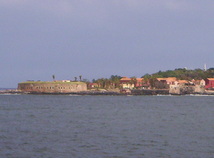 Gorie Island, Senegal
(Cont. from p. 1)
I look out across the sea and see the faint lights of Gorie Island, the closest point of Africa to America. And world-renowned site of the infamous prison, the point of no return, for millions of people brought to America as slaves. I am in Senegal this week for a unique annual gathering, along with more than 500 teachers from around the world. These teachers are part of a network of more than 20,000 teachers from 120 countries who are engaged in direct global learning collaborations among students in their classrooms. It is all part of the International Education and Resource Network (iEARN), a 17 year old organization I now work with. And we are learning about ourselves and our world in a way that was impossible when most of us went to school. I am in Africa for the first time in my life. It is not at all what I imagined when I first studied this continent back in 5th grade at Westview Elementary in Spokane. I still have the colorful map I created of Africa back then, with each country neatly colored in. My crafty innovation was to color each country's border with a dark heavy line, and have the chosen color fade as I colored into the center of said country. There I carefully printed the name of the identified place. We learned about the pyramids, about the minerals and gold there, and slaves coming over and that was pretty much it for Africa. This week I have attended a bunch of workshops led by teachers who are demonstrating how they are teaching their students to learn now about the world we live in. For example, in one workshop the teacher demonstrated that instead of learning about the transatlantic slave trade in books alone, students talk directly (using the internet) with students in Senegal and Gambia and Benin and compare notes and experiences. I learn that it is French colonialism more than the slave trade that is more on the minds of present day West Africans. I learn more details about the black tribal chiefs who played pivotal roles in promoting the slave trade and Senegalese women who were slave trade jailers along with the Portuguese guards. I have met teachers from Sierra Leone, Togo, Gambia and Uganda, countries that I don't at all remember being on that earlier African map of mine. Most of all, I keep being reminded about how this kind of collaborative learning is about gaining insights into one's own country and self as much as it is about learning about other countries and their people. Wendy, the history teacher leading this workshop, said her students often ask, "Why do we have to study such ancient stuff?" (Sound familiar?) One of the reasons, she noted, was to see the parallels to current dilemmas students may now face. Take the native women jailers who collaborated with the Portuguese in jailing the slaves. How could they do such a thing, she asked? Turns out the only hope they had to win their freedom after they were captured as slaves and awaiting sail to America was to become pregnant by the jailers. In so doing, they could serve in this new role and avoid a lifetime of slavery or death on the voyage over. 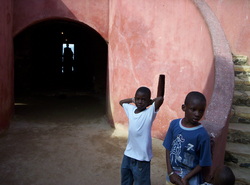 Inside the slave house,Senegal
Wendy's students, three of whom came to the conference and presented with her, told us that they examined how they might be collaborators in some way with present day oppression in the choices they make. They talked with other students around the world using the internet through iEARN, and identified current day sweatshops and related consumer purchases they make as the issue they would work on. Then went on to carry out a strategy to persuade others in their community to examine their consumer purchases.
It is pretty incredible to find out how much you don't know when you start communicating with others around this world. One day this week we took a bus trip out to Pink Lake (a lake as salty as the Dead Sea, and a brilliant pink hue), stopping at a giant turtle reserve along the way. We looked like the United Nations on wheels, and I was sandwiched in between women from Iran, Egypt and Slovenia. I was dead-on in knowing where Iran and Egypt were, but try as I might, I struggled with Slovenia, despite my tenacious African topography from Westview elementary days. I finally succumbed to asking them the location of their country, to which they replied, "That's OK; we have been asked that before by Americans. Let's see, do you know where Europe is?" they asked impishly. (What ever happened to those fine teachers who said there is no such thing as a dumb question?!). Turns out it was once part of Yugoslavia, and gained independence in 1991. The teacher, Nives, works at the local university and trains teachers all over the country to get involved in iEARN learning collaborations. She handed me some brochures showing a country of astounding beauty, (plus a couple of really fine water parks they have--which I have a real weakness for-- that would humble our own Enchanted Village water park!). Nives is one of 25 country coordinators that Jennifer Geist, one of my colleagues in this project, and I met with this week. The countries with country coordinators engaged in this work astounded me. From Muslim countries like Morocco, Iran, Senegal and Iran, to countries like Taiwan, Japan and Argentina, the range is both broad and deep. When I embarked on this idea over a year ago to link our schools in the northwest with schools around the world I thought I would have to find the schools one by one outside the US, and piece together the curriculum ideas to start the engagement. The beauty of iEARN is that they have spent more than a decade already doing that, and the evidence was so clear as Jennifer and I got to know all of these teachers and country coordinators. I am excited about matching up these teachers when I return with the teachers in the Northwest that are now working with us to learn in this new way. Travel like this is full of personal disappointments. I was walking down a dusty street in Dakar earlier in the week, seeking out a pharmacological answer to a common travel "issue." As a light-skinned traveler in Senegal, one feels the burden of not really blending in too well. (And no, I did not wear my bright red shorts this time, Peter, as I did in Nicaragua that first year!) The local vendors descend on you quickly, and you begin to feel a little like fresh meat. I was keeping my head down, and trying my best to keep eye contact to a minimum, and not accept any "free gifts" as the vendors call them, as they force trinkets in your hand as a gesture of brotherhood (and a highly refined methodology of keeping you engaged with them till you relent and buy something-- anything.) The vendors usually are competent in 4-5 languages, with another 2-3 languages they can fake pretty well, so acting like you don't know what they are saying is pretty tough, but I was trying my hardest. By the end of the two block gauntlet it was clear that I was being treated as a "walking wallet," and I was treating everyone approaching me as a leper. The last person I passed on that street called out to me, "Bon jour!" from across the street and I gave him a sharp "don't come near me" look. Something caught my eye as I walked quickly past that caused me to give him a second look. Maybe it was a color in his shirt, I don't know. But after a few more steps I turned and realized he was the Senegalese hotel clerk who had one hour earlier pulled some strings for me to get me out of the Malaria Room (site of the Mosquito War noted above) and into another hotel suite. I walked briskly across the street and shook his hand, saying enthusiastically in my best French, "Merci, mi amigo" (I speak a sort of fluent Spango-French, I am told). I know I just got lucky with that one. How many people did I walk by in the past week, leaving in the wake a reconfirmation of a preconceived stereotype of Americans as stand-offish, egotistical and above it all? I am pretty humbled by all this. At times I think that if we can only use the new communication tools we now have available to us, we can reach a deeper and more cooperative understanding with each other around the world. Yet, despite our new ability to write, talk and even see and interact with each other virtually anywhere, using these new, low-cost technologies, we still face the daunting task of overcoming our own ability to see what we want to see. A friend sent me an article this week on the latest brain research that shows how we filter and dramatically alter what we see everyday. Things that are right in front of us are completely missed if we are not looking for them. And I see, even here, when I am trying my best to engage in authentic relationships, it is so easy to fall into seeing only what I expect to see. And so, just communicating is not enough. We need ways to keep opening our own personal lens wider and wider to see more of what is really there. Practice helps. So does having a good teacher who can help us keep looking for the story behind the story. Travel like this is also full of triumphs of encouraging discovery. I had heard that the banjo had originated in Africa and brought over by slaves, so I brought my own backpack banjo to see if I could get in a jam or two. And while I did not find any bluegrass bands on the beach, I did jam one morning with a guitar toting Senegalese, and saw some evangelical Moroccans strumming on the old banjo to a crowd in Marrakech, prior to giving a fire and brimstone sermon on Islam. And yes, even in Africa, the sound of the banjo still makes people smile. |
